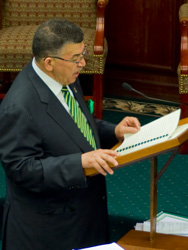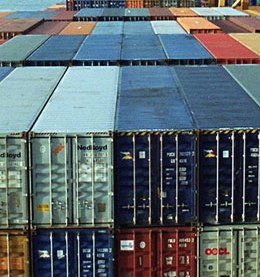Archive for November 2nd, 2010

Mac under pressure to enshrine 21 day rule
 (CNS): Following mounting controversy over the government’s continued suspension the public consultation period for new laws and amendments, the opposition has submitted a motion calling for the necessary changes to be enshrined in the Legislative Assembly’s rules. The Cayman Islands Constitution 2009 says that the Legislative Assembly Standing Orders require that all laws brought by government need to be published at least 21 days before the meeting except in the case of an emergency. In its first report published last month the Constitutional Commission also called on the government to amend the House rules to formalise the period of public debate and discussion and comply with the Constitution. (Photo by Dennie Warren Jr)
(CNS): Following mounting controversy over the government’s continued suspension the public consultation period for new laws and amendments, the opposition has submitted a motion calling for the necessary changes to be enshrined in the Legislative Assembly’s rules. The Cayman Islands Constitution 2009 says that the Legislative Assembly Standing Orders require that all laws brought by government need to be published at least 21 days before the meeting except in the case of an emergency. In its first report published last month the Constitutional Commission also called on the government to amend the House rules to formalise the period of public debate and discussion and comply with the Constitution. (Photo by Dennie Warren Jr)
Although the current standing order 45 requires that all potential bills be published and gazetted before a bill is read for a second time in the LA, the government has suspended this order via a vote in the House on a considerable number of occasions since taking office. In a recent interview with Cayman 27 the premier justified the suspensions as he said the laws were needed to facilitate the country’s offshore business and he did not have time to waste.
However, the problems associated with rushing laws through the assembly were highlighted recently with the Dormant Accounts Bill. Although Bush had told his legislative colleagues that the financial sector had been consulted at the time the bill was brought to the House, since then it has been revealed that the industry had very grave concerns about the damage that the law could do to offshore business. The law was designed to give government access to the funds in accounts that had been abandoned but the legislation appears to encroach on long term investment products as well.
In a twelve-page memo to government, the Financial Services Legislative Committee said that because the necessary experts were not consulted before government passed the law it had potentially dangerous consequences for the financial services industry. The sub-committee said that unless it was changed it would have “a serious and irreversible adverse impact" on what was revealed to be a long list of key financial service industries, from investment funds to private wealth management services.
This was one of a number of bills rushed through the House over the last year or so and the Constitutional Commission has called on government to amend Standing Orders to reflect the Constitution. Wil Pineau (one of three constitutional commissioners) said the concept of what constitutes an emergency then has to be defined. He pointed out that if government was suspending orders every time, then it clearly cannot be extraordinary or an emergency.
The opposition motion presented by Alden McLaughlin and seconded by Kurt Tibbetts is expected to be debated in the House this week, if it makes it to the order paper, and calls on government to take the necessary steps to comply with section 77(2) of the Cayman Islands Constitution Order and amend the Standing Orders as soon as possible.
The public consultation period is not just a provision for the opposition to debate a particular bill, but also allows the public to read and consider government’s proposed legislation and for the man in the street to raise concerns or offer support.
Speaking on Cayman 27’s "Lets Talk to the Experts" on Monday evening, Human Rights Commission Chair Richard Cole pointed out that it is part of the wider democratic process which allows the people to tell their own MLAs what they think of a bill that is coming before the Legislative Assembly and whether or not they want their elected representatives to support it or not.
Publishers to turn phone books into insulation
(CNS): A new programme launched by the publishers of the local telephone directories aims to keep over 60 tons of phonebooks from the George Town landfill and instead turning them into insulation for homes. Organisers said that the Yellow2 Green project is a first step in the goal towards finally introducing recycling in the Cayman Islands. Eleven drop of points have been installed around Grand Cayman where people can drop old directories which will then be shipped to Tampa and turned into a fibre that can be used as domestic insulation. The pilot project which started on Monday 1 November will last until 20 November.
With the new directories expected to have been delivered in October the organizers said people should have received a new directory before the end of the three week recycle programme, the company also says it will accept directories from other publishers.
Global Directories the publishers of the Cayman Islands Yellow Pages telephone books said that if the programme is successful they expect to run it annually and possibly include the Sister Islands in future. The Cayman Islands Chamber of Commerce has been designated the primary corporate collection site at the Governor’s Square office. The other general sites include all the islands supermarkets as well as LIME stores and Camana Bay.
As organizers say they want to involve the entire community they have also launched a challenge for the local primary schools, which will receive prizes for taking part. A grand cash prize of $1500 will be given to the school that collect the most directories withwinners being chosen on a ratio of total books to students enrolled.
Interested school should designate a Challenge Coordinator and have them contact Eileen Keens, Marketing Manager for Global Directories at 814-1798 or send an email to: ekeens@globaldirectories.com to confirm your participation.

Customs lacks ‘harmony’ but upgrades IT
 (CNS): Although the country’s custom’s department is promising importers a more efficient service with the upgrading of its IT systems officials said there seems to be a lack of urgency when it comes to implement an internationally recognized harmonised customs tariff. The collector of customs says that if the tariffs were standardized government would more accurately predict the money it expects to take and he believe it would also increase the take to government coffers. Although the idea of implementing the international harmonization codes has been discussed for several years despite the departments pleas there is still no legislation.
(CNS): Although the country’s custom’s department is promising importers a more efficient service with the upgrading of its IT systems officials said there seems to be a lack of urgency when it comes to implement an internationally recognized harmonised customs tariff. The collector of customs says that if the tariffs were standardized government would more accurately predict the money it expects to take and he believe it would also increase the take to government coffers. Although the idea of implementing the international harmonization codes has been discussed for several years despite the departments pleas there is still no legislation.
Calling on local business to lobby their elected officials Colin Powery the top customs officer told members of Cayman Islands Chamber of Commerce at the Be Informed meeting that he believed it was a “lack of political will” which was holding up the introduction of the harmonization system.
“The customs service has made several presentations to Cabinet about this,” Powery said adding that he believed it would boost customs collections and make predictions about that revenue far more accurate.
The current Customs Tariff Law sets out the dutypeople must pay on all dutiable goods and it is a very long and sometime confusing list. The lists are so long and confusing that customs officers admitted they themselves sometime do not know what rate a particular item should be charged at.
In the first quarter of this financial year Powery said customs collected CI$35.4 million in duty therefore he believed if the trend continued the department would be on target to collect almost $142 million in duty putting it on target to exceeding the estimates for revenue in this year’s budget. However he pointed out that there “was tremendous potential” with the harmonisation code for government to increase the amount it collects through the increase in efficiency the international harmonization would bring.
One local business owner however raised some concerns about the harmonisation. Billy Adam the owner of Hobbies and Books said he believed the reluctance to implement the system came down to the fact that it would be an enormous undertaking for small businesses to manage especially if they did not have sophisticated computer systems for their importation records. “It will be very time time-consuming and difficult for people to use and add to the cost of doing business in Cayman,” he said.
The customs officers agreed that there had been some reluctance from local business but once the system was in place they said it would in fact make life easier for local traders.
In the meantime, however, customs officials said that the improvements in the department’s computer systems would mean business owners would soon be able to do their customs paper work and pay their duty on line. Officials said as importers were able to stay at their desks customs officers would in turn enable customs officers to get out from behind theirs and work more on compliance to ensure local businesses were paying their duty in accordance with the law.